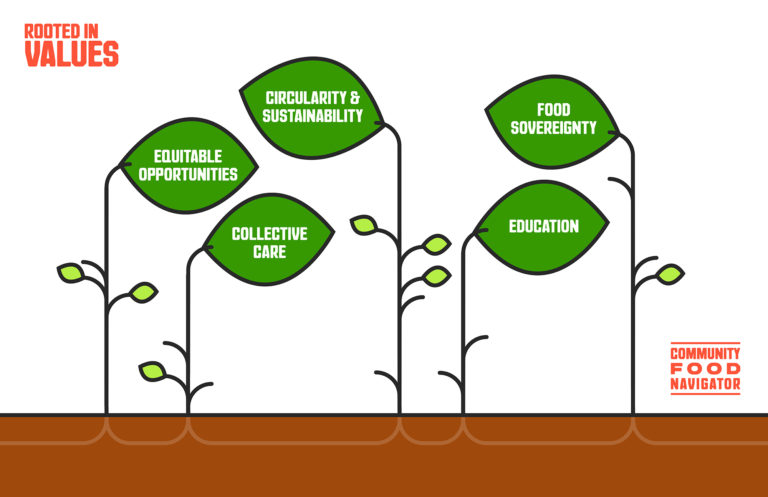
Our Mission
Community Food Navigator works towards greater food sovereignty for all people. We focus on supporting the Black, Brown, and Indigenous growers, producers, educators, and organizers in Chicago’s food ecosystem working towards widespread food sovereignty.
We acknowledge that institutional, environmental, and interpersonal racism continue to cause harm in Black, Brown, and Indigenous communities. We offer Community Food Navigator as a space to constructively work through difficult conversations and to repair gaps in empathy and trust.
Finally, we celebrate the joy and dignity inherent in community-driven food solutions, and we work to elevate wellness, belonging, healing, and agency in our community. We know this work moves with the seasonal pace of growing food and, importantly, at the speed of trust.

What is Food Sovereignty?
Food sovereignty is a food system in which the people who produce, distribute, and consume food also control its production, distribution, and governance. This stands in contrast to the present-day corporate food establishment, in which corporations and market institutions dominate the global food system. In its place, we envision:
- Access to local, sustainable, community-led food for all
- Increased recognition of the existing work of Black, Brown, and Indigenous people to support their communities
- Increased investment in local and/or smaller-scale food systems that support the wellbeing of Black, Brown, and Indigenous people
- Increased Black, Brown, and Indigenous power in equitable policy- and decision-making
- Prioritization of reparative policies for Black, Brown, and Indigenous cultures
The values of food sovereignty as we understand them include:
Collective Care – Collective care refers to communities that value the collective wellbeing over monetary and capitalist gain. Such communities believe in collective action rooted in transparency, support, and connection.
Education – Food education should include opportunities for growers to develop new skills, try out new tools and infrastructures, and learn about other jobs in the food sector. It should also include opportunities for consumers to increase their own food literacy and learn how to acquire more local and sustainable options.
Equitable Opportunities – Just and sustainable food systems must prioritize equitable opportunities for Black, Brown, and Indigenous communities. As it relates to community food specifically, centering equity looks like:
- Telling stories of success, joy, and abundance in Black, Brown, and Indigenous communities
- Reparative investment in exploited Black, Brown, and Indigenous communities
- Equitable food distribution through the creation and support of new infrastructures
- Learning and employment opportunities for all community members
Circularity & Sustainability – Circular and sustainable systems remove the strain on growers and create self-sustaining economies that keep value in place. They lead to collaborative support between peers, incorporate creative and mixed use of land and infrastructure, help build community wealth, are fueled by renewable sources of energy, and value a diversity of regenerative farming practices from traditional and indigenous to newer, technologically-supported practices.
